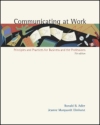Interviewing is a face-to-face conversation in which at least one party has
a specific, serious purpose. As such, it is perhaps the most common form of
planned communication. Interviewing differs from other types of conversation
in its purposeful nature, its degree of structure, its imbalance of control
and speaking by one party, and its bipolarity. A good deal of planning should occur before an important interview begins.
The first step involves defining the objective as clearly as possible. At the
same time, each party should analyze the other, tailoring the interview to the
other's self-concept, knowledge level, image of the interview partner, and attitude
toward the topic. The best way to obtain this information is through what others
say, what the person in question says, and what you observe. Having defined the objectives, both interviewer and respondent should prepare
agendas, listing the areas they want to cover during the meeting. The interviewer
should decide whether a highly structured, moderately structured, or nonstructured
format is most desirable. It is also critical to plan important primary and
secondary questions in advance of the interview. When forming questions, the
interviewer should consider desired depth, open versus closed nature, direct
or indirect approach, whether fact or opinion is sought, and whether hypothetical
or actual inquiries will be most productive. Leading and loaded questions ought
to be avoided. Finally, the interviewer and interviewee ought to choose a setting
that promotes the best possible outcome. The interview itself consists of three parts. The opening establishes rapport,
orients the respondent, and offers motivation for contributing. During the body,
the interviewer should keep the conversation focused, listen actively, and probe
for additional information when necessary. The respondent should give clear
and detailed answers, correct any misunderstandings, and cover his or her own
agenda. The closing ought to review and clarify what has occurred, establish
what actions will occur in the future, and conclude with pleasantries. Besides attending to practical considerations, participants in an interview
are obliged to behave in an ethical manner. Interviewers should treat every
interviewee with respect, keep confidences, make only promises they are prepared
to honor, and avoid coercing the respondent. Interviewees should prepare for
the session to avoid wasting the interviewer's time and should represent both
facts and their positions honestly. |



 2002 McGraw-Hill Higher Education
2002 McGraw-Hill Higher Education